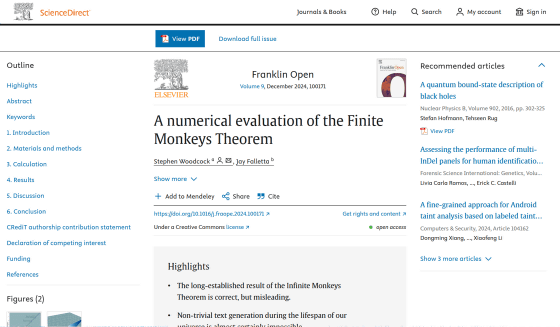Research results: 'Even if monkeys keep typing, they won't be able to write Shakespeare before the end of the universe'

A numerical evaluation of the Finite Monkeys Theorem - ScienceDirect
https://www.sciencedirect.com/science/article/pii/S2773186324001014

It's not to be. Universe too short for Shakespeare typing monkeys | University of Technology Sydney
https://www.uts.edu.au/news/health-science/its-not-be.-universe-too-short-shakespeare-typing-monkeys
Scientists Confirm Monkeys Do Not Have The Time to Write Shakespeare : ScienceAlert
https://www.sciencealert.com/scientists-confirm-monkeys-do-not-have-the-time-to-write-shakespeare
The Infinite Monkey Theorem is used in many situations and fictional works as a metaphor for the principles of probability and randomness, and how chance can lead to unexpected results. However, when you first heard of the Infinite Monkey Theorem, you may have wondered, 'Yes, if you have infinite time, it's possible for something ridiculous to happen by chance, but could a monkey really write Shakespeare?'
Mathematicians Stephen Woodcock and Jay Falletta from the University of Technology Sydney in Australia have considered a 'finite monkey theorem' rather than an 'infinite monkey theorem,' which sets time and the number of monkeys to plausible finite values.
'The Infinite Monkey Theorem only considers the infinite limit, where either the number of monkeys is infinite or the amount of monkey labour is infinite,' Woodcock said. 'We chose to examine the probability that a string of characters can be typed by a finite number of monkeys in a finite amount of time, over a range consistent with the estimated lifetime of our universe.'

The research team set the monkey population to a range of up to 200,000, which is the estimated population of chimpanzees. In addition, the typewriter had 30 keys including the English alphabet and punctuation marks, and the monkey pressed the typewriter key once per second. In addition, the monkey's operating time was assumed to be 10 100 years (1
As a result, assuming a monkey's life span of about 30 years, the probability that a monkey would accidentally type the word 'Bananas' in its lifetime is only 5%. This suggests that it would be difficult to produce even a single word if a typewriter with 30 keys were to type completely randomly.
And the odds of 200,000 monkeys accidentally writing all 884,647 words of Shakespeare's works by the time the universe ends are a staggering 6.4 × 10 -7448254 , a probability that can be safely considered 'close to 0%.'
The probability of completing the entire 1,800-word ' Curious George ' series is 6.4 × 10 -15043 , which is almost 0%. In other words, the probability that a monkey would be able to write any literary work before the end of the universe is close to 0%, even for works much shorter than Shakespeare's works.
'It is unlikely that improvements in typing speed or increases in chimpanzee populations would make ape labour a viable tool for significant text production,' the team concluded.

'This discovery puts the Infinite Monkey Theorem in the same league as other probability puzzles and paradoxes, such as the St. Petersburg Paradox , Zeno's Paradox and Ross–Littlewood Paradox , which suggest that using the idea of 'infinite resources' gives results that are inconsistent when taking into account the constraints of the universe,' Woodcock said.
'In the age of generative AI, the Infinite Monkey Theorem and its finite counterparts invite readers to consider philosophical questions about the nature of creativity, meaning, and consciousness, and how these essences emerge,' the research team said.
Related Posts:







